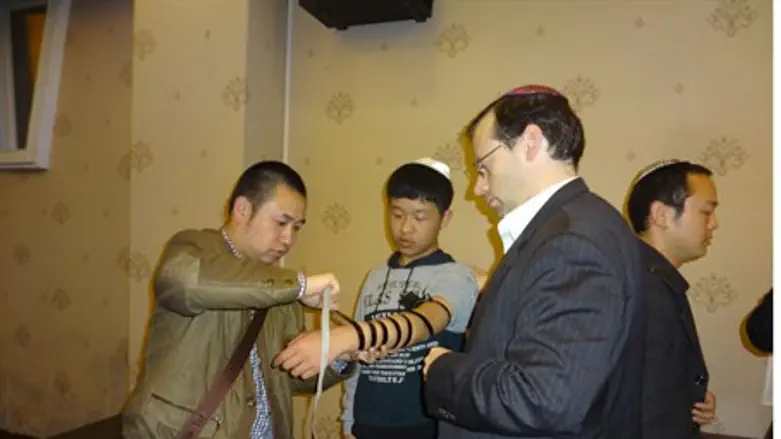
Nearly 100 members of the ancient Jewish community of Kaifeng, China, are expected to attend a first-of-its-kind traditional Pesach (Passover) Seder that will take place next Monday, April 14, at the start of the holiday in Kaifeng.
The Seder, which is being sponsored by the Jerusalem-based Shavei Israel organization, will be conducted for the first time by 28-year-old Tzuri (Heng) Shi, who made Aliyah (moved to Israel) from Kaifeng a few years ago with the help of Shavei Israel and completed his formal return to Judaism last year.
As part of the preparation for the upcoming Seder, Tzuri was sent to Kaifeng by the Shavei Israel organization with all of the traditional Pesach items. He brought Kosher Matzah packages from Israel, Kosher for Passover wine, Passover Haggadahs (traditional book used on Passover that explains the order of the Seder), which were prepared especially in Hebrew and Chinese, Kosher for Passover cakes, traditional red horseradish, and traditional Charoset (a sweet, dark-colored paste made of fruits and nuts eaten at the Passover Seder).
The Shavei Israel organization helps groups with Jewish origins, such as the Bnei Menashe of India, return to the Jewish people. On Thursday, founder Michael Freund was awarded the Moskowitz Prize for Zionism for his activities.
Freund has worked to strengthen ties with local Chinese Jews who trace their ancestry to the city's ancient Jewish community. In 2009, one of the first groups of Chinese Jews returned to Israel from Kaifeng.
"We are proud and excited to organize this historic event," Freund said. "Kaifeng's Jewish descendants are a living link between China and the Jewish people, and it is very moving to see the remnants of this community returning to their Jewish roots as they prepare for Passover," he added.
Scholars believe the first Jews settled in Kaifeng, which was one of China's imperial capitals, during the eighth or ninth Century. They are said to have been Sephardic Jewish merchants from Persia or Iraq who made their way eastward along the Silk Route and established themselves in the city with the blessing of the Chinese emperor.
In 1163, Kaifeng's Jews built a large and beautiful synagogue, which was subsequently renovated and rebuilt on numerous occasions throughout the centuries. At its peak, during the Ming Dynasty (1368-1644), the Kaifeng Jewish community may have numbered as many as 5,000 people. But widespread intermarriage and assimilation, as well as the death of the community's last rabbi, brought about its demise by the middle of the nineteenth century.
Nevertheless, many of the families sought to preserve their Jewish identity and pass it down to their descendants, who continued to observe various Jewish customs. Currently, there are estimated to be approximately 1,000 Jewish descendants in Kaifeng.
“In recent years, many members of the community have begun to explore their heritage – thanks in part to the Internet, which opened up new worlds for them and provided access to information about Judaism and Israel that was previously inaccessible to them,” Freund noted.